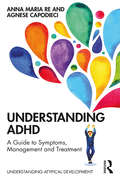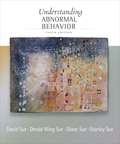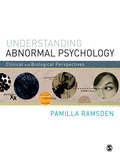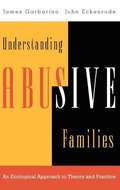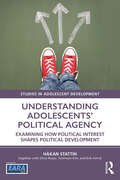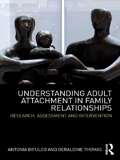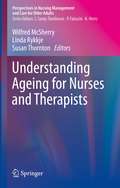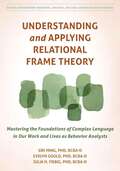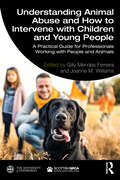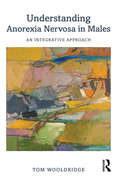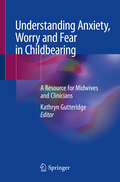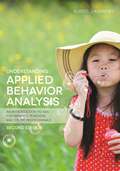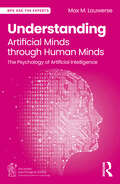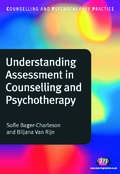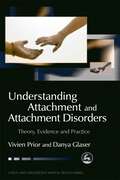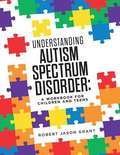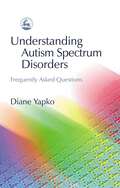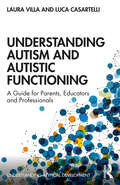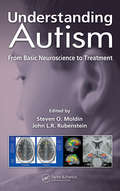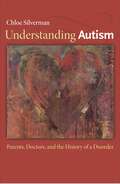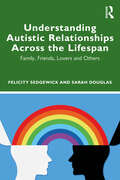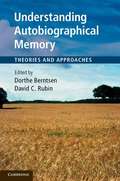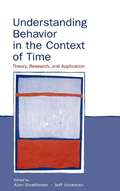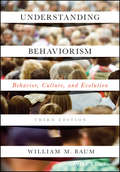- Table View
- List View
Understanding ADHD: A Guide to Symptoms, Management and Treatment (Understanding Atypical Development)
by Anna Maria Re Agnese CapodieciThis essential guide provides accessible, concise, evidence-based guidelines on Atttention Deficit Hyperactivity Disorder (ADHD), offering a deeper scientific understanding of the condition and its consequences. It offers ideas and insights for managing the condition in daily family life and promoting the most effective self-regulation strategies for children and adolescents, allowing parents to better understand the origins of their child’s behaviour and avoid potential negative consequences. In this straightforward text, Capodieci and Re set out the basic theories on ADHD and cover key topics including parent-child relationships, helping children understand their condition, friendships with peers, comorbidities, classroom strategies, and how families and professionals can best work together. Taking into account the most recent updates to the DSM-5 definition of ADHD, the authors emphasise the importance of a multifocal approach to the treatment of ADHD, involving the child’s teachers, parents and peers, to better develop family and peer relationships. They offer strategies for the classroom, for good sleep and for healthy eating and physical activity, and support for any other learning, language, movement and emotional problems an ADHD child might have. Understanding ADHD will be essential reading for parents of children with ADHD, as well as health, education and social care professionals involved in the field.
Understanding Abnormal Behavior
by David Sue Stanley Sue Derald Sue Diane SueFeaturing current research, high-quality scholarship, and an appealing design, UNDERSTANDING ABNORMAL BEHAVIOR, 10th Edition, provides an inviting and stimulating look into abnormal psychology. The first abnormal psychology book to present a thoroughly integrated multicultural perspective -- based on the authors' view that cross-cultural comparisons can greatly enhance the understanding of disorders -- the text provides extensive coverage and integration of multicultural models, explanations, and concepts. It also continues the multipath model introduced in the 9th edition, emphasizing the importance of considering biological, psychological, social, and sociocultural factors, as well as their interactions in the etiology of mental disorders. The book helps you gain an understanding of abnormal behavior as scientific and clinical endeavors, while providing insight into the tools that mental health professionals use to study and treat disorders. It also begins to discuss the proposed changes in the APA's DSM-5 definition of mental disorders and its implications, including its change of focus from a categorical to a dimensional system of personality assessment.
Understanding Abnormal Psychology: Clinical and Biological Perspectives
by Pamilla RamsdenUnderstanding Abnormal Psychology provides a thorough understanding of abnormal psychology with a focus on the integration of psychology, biology and health. It goes beyond a descriptive overview of clinical disorders to provide a critical appreciation of the multifaceted aspects of mental illness. Each disorder is clearly and succinctly explained with the support of case studies. These examples are then used to introduce the debates surrounding current research, the biology of abnormal disorders and standards of treatment. The bridge between the biological elements of brain functioning and the psychological mechanisms that are responsible for coping and adjustment is thoroughly explored. This valuable consideration of the range of elements involved in the diagnosis and treatment of clinical disorders will provide you with a broad and critical understanding of this complex and fascinating field. Visit the companion website at www.sagepub.co.uk/ramsden with a number of useful features for students, including a flipcard glossary of key terms from the textbook and a test bank of interactive self-assessment multiple-choice questions.
Understanding Abusive Families: An Ecological Approach To Theory And Practice
by James Garbarino John EckenrodeAn up-to-date analysis of the factors contributing to abuse <p><p> This newly revised edition of a classic in the field of child abuse and neglect presents effective guidelines for prevention, protection, and rehabilitation. <p> Compelling and compassionate, this book explores why and how families become abusive. It then offers both the wisdom and specific clinical interventions that will aid in the understanding of abuser and victim.
Understanding Adolescents’ Political Agency: Examining How Political Interest Shapes Political Development (Studies in Adolescent Development)
by Håkan StattinThis ground-breaking volume shows that young people largely shape their own political development, and that to understand young people's political development, we must consider their political agency.Håkan Stattin explores the findings of an extensive longitudinal study of the political socialization of young people in Sweden from the ages of 13 to 28, which shows that, contrary to popular belief, it is not parents, peers, teachers or other key adults who are the primary agents in shaping young people's political development; it is their own self-directed political interest. Given that political interest is both an input and an output, the book examines how political interest affects young people's political interactions with their parents, and why young people and their parents perceive these interactions differently. It covers key issues such as the impact of political-interest-triggering events and civil unrest, the role of school and peers, parental involvement and the path from political interest to future political and civic engagement.Launching a new field of research internationally, this volume is essential reading for researchers, students, educators, and policy developers interested in young people's political and civic attitudes, engagement, communication, core values and the emergence of intrinsic political sophistication.
Understanding Adult Attachment in Family Relationships: Research, Assessment and Intervention
by Antonia Bifulco Geraldine ThomasAttachment theory has become a key focus of both research and practice in understanding and treating psychological and social risk for marital and relationship problems, parenting and clinical disorders. In particular, adult attachment style is a key explanatory factor for understanding problems in human relationships. This practical book introduces and explains an easily accessible assessment tool for adult attachment style, the Attachment Style Interview (ASI). Based on extensive research study, it discusses appropriate interventions and case assessments that can be made to help families in need. Simpler than the Adult Attachment Interview, which requires expert administration, the ASI is an invaluable and evidence-based resource. Presenting clear and concise descriptions of the measure and summaries of the attachment models developed, this text provides discussions of its relevance for different practice contexts, and uses a range of worked case studies to illustrate its principles and applications. It details attachment issues in different relationship domains to cover areas of risk and resilience relevant for practice such as: Adult depression and anxiety and stress models, Partner difficulties including domestic violence, Childhood neglect and abuse as a source of attachment problems, Parenting and intergenerational transmission of risk, Interventions, service application and use in family therapy. Understanding Adult Attachment in Family Relationships provides an important reference for all practitioners working with children, adolescents and families, especially those undertaking further study.
Understanding Ageing for Nurses and Therapists (Perspectives in Nursing Management and Care for Older Adults)
by Wilfred McSherry Linda Rykkje Susan ThorntonThis volume is a practical resource for all those responsible for caring for older people across health and social care. It provides a comprehensive and holistic approach helping nurses, therapists and social care professionals to better understand the impact of ageing upon the person and wider society. A unique feature of this text is the focus upon positive ageing and the attempt to dispel and challenge some of the myths, prejudices and negative attitudes that still prevail towards ageing and older people. A key objective of the book is to introduce practitioners to some of the neglected or under-addressed aspects of ageing such as spirituality, sexuality, and LGBT.Chapters are written in an engaging and interactive style and where appropriate draw upon case studies and scenarios to maximize engagement developing competence, by informing knowledge, attitudes and skills. The text introduces the practitioner to key dimensions of what it is to be a person, physically, psychologically, socially and spiritually and how these contribute to the ageing process and can enhance the quality of life of older people.Irrespective of whether one cares for older people in an acute hospital setting or domiciliary, home care, this text will be of relevance. The material and content transcend health and social care boundaries, providing valuable, contemporary evidence that can inform and shape practice. Above all this text will encourage reflection, dialogue and engagement with some fundamental aspects of ageing, challenging, attitudes, values and behaviour so that a more positive and balanced insight towards ageing is fostered. This book will ensure that self-awareness and professional practice are enriched and informed and the practitioner has a holistic understanding of ageing that will enable them to care for older people with compassion, dignity and respect.
Understanding Analysis and its Connections to Secondary Mathematics Teaching (Springer Texts in Education)
by Stephen Abbott Nicholas H. Wasserman Timothy Fukawa-Connelly Keith Weber Juan Pablo Mejía RamosGetting certified to teach high school mathematics typically requires completing a course in real analysis. Yet most teachers point out real analysis content bears little resemblance to secondary mathematics and report it does not influence their teaching in any significant way. This textbook is our attempt to change the narrative. It is our belief that analysis can be a meaningful part of a teacher's mathematical education and preparation for teaching. This book is a companion text. It is intended to be a supplemental resource, used in conjunction with a more traditional real analysis book.The textbook is based on our efforts to identify ways that studying real analysis can provide future teachers with genuine opportunities to think about teaching secondary mathematics. It focuses on how mathematical ideas are connected to the practice of teaching secondary mathematics–and not just the content of secondary mathematics itself. Discussions around pedagogy are premised on the belief that the way mathematicians do mathematics can be useful for how we think about teaching mathematics. The book uses particular situations in teaching to make explicit ways that the content of real analysis might be important for teaching secondary mathematics, and how mathematical practices prevalent in the study of real analysis can be incorporated as practices for teaching.This textbook will be of particular interest to mathematics instructors–and mathematics teacher educators–thinking about how the mathematics of real analysis might be applicable to secondary teaching, as well as to any prospective (or current) teacher who has wondered about what the purpose of taking such courses could be.
Understanding And Applying Relational Frame Theory: Mastering The Foundations Of Complex Language In Our Work And Lives As Behavior Analysts
by Siri Ming Evelyn Gould Julia H. FiebigA comprehensive treatise on how to understand complex language, and use language effectively as a behavior analyst. Language changes everything. From infancy through adulthood, language shapes how we live our lives and interact with other people, in increasingly complex ways. Language also shapes how we exist in the world as professionals—and how we operate as a profession. As behavior analysts working with others to effect change, words matter. A comprehensive understanding of complex language is therefore critical to practicing effectively as a behavior analyst. Understanding the functions of complex language, allows us to skillfully use language as an intervention tool. Relational frame theory (RFT) is a behavior analytic theory of human language. RFT suggests that the building block of human language and higher cognition is relating—in other words, the human ability to create links between one thing and another using words. Understanding and Applying Relational Frame Theory outlines the essential principles of RFT, and offers practical applications and tools to help clients live better lives and to establish the conditions necessary for all of us to thrive. With a central focus on establishing psychological flexibility, prosociality, and cooperative contexts for change, at all levels of analysis—from the self to overarching systems and cultures—in this book, you will: Learn the theoretical basis of RFT, including how relational operants are learned, from their roots in early social interactions to the complex relating of relations and relational networks seen in analogical and metaphorical reasoning. Explore how complex verbal repertoires affect individual behavior, introducing the development of the self and the influence of rule-governed behavior and private events. Examine relational framing in the context of groups—including the speaking and listening skills needed for supervision, mentorship, effective messaging, and prosociality within and between organizational systems. Discover the implications of applying a behavior analytic understanding of complex language to a variety of settings, including education, mental health, and business. Learn how RFT can be applied to issues of diversity and inclusion, and global sustainability. Finally, you’ll find a thorough discussion of how behavior analysts can use the principles outlined in this book to extend the reach of the field into a range of socially significant and critical areas for behavior change.
Understanding Animal Abuse and How to Intervene with Children and Young People: A Practical Guide for Professionals Working With People and Animals
by Gilly Mendes Ferreira Joanne M. WilliamsUnderstanding Animal Abuse and How to Intervene with Children and Young People offers a positive, compassion-based and trauma-informed approach to understanding and intervening in animal abuse. It provides an accessible cross-disciplinary synthesis of current international evidence on animal abuse and a toolkit for professionals working with people and/or animals to help them understand, prevent and intervene in cases of animal abuse. With contributions from experts in the field, this essential text offers ten user-friendly chapters with questions for reflection and key summary points. It offers a definition of animal abuse, synthesises the latest research on children, young people and animal abuse, explores the link between animal abuse and other forms of abuse and outlines legal perspectives on animal abuse. The second half of the book presents a practical toolkit for professionals, offering guidance and strategies for the prevention of and intervention in cases of animal abuse. It provides multidisciplinary perspectives on interventions; from teachers’ and social workers roles in detection and intervention of childhood animal abuse, to the roles of enforcement agencies and veterinarians in legal cases of adult animal abuse. Together with a final chapter proposing new directions for research, policy and practice, this guide is for all who work with children, young people and/or animals, including psychologists, social workers, veterinarians, education professionals and animal welfare educators. It is also a key reading for those involved in legal and policy issues relating to animal welfare.
Understanding Anorexia Nervosa in Males: An Integrative Approach
by Tom WooldridgeBecause anorexia nervosa has historically been viewed as a disorder that impacts women and girls, there has been little focus on the conceptualization and treatment of males suffering from this complex disorder. Understanding Anorexia Nervosa in Males provides a structure for understanding the male side of the equation combined with practical resources to guide clinical intervention. Presented using an integrative framework that draws on recent research and organizes information from multiple domains into a unified understanding of the interconnected issues at hand, this informative new text provides a comprehensive approach to understanding and treating a widely unrecognized population.
Understanding Anxiety, Worry and Fear in Childbearing: A Resource for Midwives and Clinicians
by Kathryn GutteridgeThis book informs and enlighten health professionals on how the recognition of fearing women can change their episode of care during childbearing. It gives practical advice on the way women present to services and the challenges that this invokes. This work is the first of its kind aimed at clinicians to deconstruct ideology around childbearing myths and its challenges. The authors review the evidence that exists and how modern maternity systems are responding to fear and shaping healthcare. Whilst some worry and anxiety is expected and indeed considered normal during childbearing, it has been suggested that this has now proliferated to a degree of abnormal for many women. Why is that and how is this panic spread? Media portrayal of birth is suggested as unrealistic material and to show only that which is dramatic and horrific. This has been considered as one factor influencing modern women. Medicalisation, technology and demand upon services is another consequence of providing almost all maternity care in hospitals. Given that the majority of childbearing women are fit and healthy is this another causative factor? By removing women from their homes and families at such a vulnerable time has a serious consequence for how she will experience her greatest leap of faith into motherhood. All of these issues are explored and examined in the book with ideas and practical suggestions of what may be done to change this increasingly common problem. This book is intended at midwives and clinicians working in maternity settings.
Understanding Applied Behavior Analysis, Second Edition: An Introduction to ABA for Parents, Teachers, and other Professionals
by Albert J. KearneyThis introductory guide to ABA demystifies the often complex terminology, the underlying principles, and commonly-used procedures of ABA using accessible, everyday language. This revised and updated edition reflects recent developments and introduces new key terms. Albert J. Kearney explains the kinds of learning and reinforcement processes that form the basis of ABA programs. Having covered these essential principles, he describes how the science of behavior analysis can be effectively applied to real life behavior problems. He looks at how behavior is assessed and various intervention techniques that are often employed with children who have autism and other special needs. Having laid these essential foundations, Kearney touches on more advanced topics: the applications of ABA in behavioral education, such as precision teaching and programmed instruction.
Understanding Artificial Minds through Human Minds: The Psychology of Artificial Intelligence (BPS Ask The Experts in Psychology Series)
by Max M. LouwerseUnderstanding Artificial Minds through Human Minds: The Psychology of Artificial Intelligence provides an accessible introduction into artificial intelligence through the lens of psychology.What are the similarities and differences between concepts known in psychology with regards to the brain, mind and behaviour, and how do they compare with their computational counterparts? With many rapid developments it becomes easy to lose sight of the very essentials of artificial intelligence. Beginning with an introduction to the relationship between AI and human minds, this popular science book goes on to discuss complex issues, including how humans and AI think, learn, remember, and use language. It doesn't shy away from complicated issues of human and AI collaboration or ethics, and provides great insight into the future of AI and applications for our society.Answering all the questions you've been too afraid to ask, Understanding Artificial Minds through Human Minds is a must-read for anyone wanting to understand more about the greatest technological advancement of a generation, and the impact for human psychology.
Understanding Assessment in Counselling and Psychotherapy (Counselling and Psychotherapy Practice Series)
by Norman Claringbull Sofie Bager-Charleson Biljana Van RijnThis book offers students and trainees a thorough guide to clinical assessment. It covers different types of clinical assessment and explores the implications of the alternative views on clients’ needs and treatment. It explores clinical assessment as an ‘art and science’ and brings the reader up to date with new requirements placed on therapists in both organisational and clinical practice based settings. In addition to outlining models for clinical assessment, it looks at the use of evidence-based practice in assessments. There are sections on doing assessments within organisations as well as from private practice.
Understanding Attachment and Attachment Disorders: Theory, Evidence and Practice
by Danya Glaser Vivien PriorThis book offers a thorough examination and discussion of the evidence on attachment, its influence on development, and attachment disorders. In Part One, the authors outline attachment theory, the influence of sensitive and insensitive caregiving and the applicability of attachment theory across cultures. Part Two presents the various instruments used to assess attachment and caregiving. Part Three outlines the influence of attachment security on the child's functioning. Part Four examines the poorly understood phenomenon of attachment disorder. Presenting the evidence of scientific research, the authors reveal how attachment disorders may be properly conceptualised. Referring to some of the wilder claims made about attachment disorder, they argue for a disciplined, scientific approach that is grounded in both attachment theory and the evidence base. The final part is an overview of evidence-based interventions designed to help individuals form secure attachments. Summarising the existing knowledge base in accessible language, this is a comprehensive reference book for professionals including social workers, psychologists, psychiatrists, teachers, lawyers and researchers. Foster and adoptive parents, indeed all parents, and students will also find it of interest.
Understanding Autism Spectrum Disorder: A Workbook For Children And Teens (Second Edition)
by Robert GrantThe revised and expanded 2nd edition of the child and teen ASD workbooks! Children and teens often have a challenging time understanding their autism spectrum disorder diagnosis. This workbook is designed to help professionals and parents explain autism to children and teens. Each worksheet covers a different topic related to gaining awareness about autism and helping children and teens better understand what it means to have an autism spectrum disorder. Through each worksheet, children and teens have the opportunity to express their thoughts and feelings and ask questions. The workbook also provides a guide for professionals and parents offering instructions, information, and suggestions for implementing and processing through each worksheet page. Professionals and parents will find Understanding Autism Spectrum Disorder a valuable tool in working with children and teens with autism. Children and teens will enjoy the engaging worksheets as they discover and process through their complex diagnosis.
Understanding Autism Spectrum Disorders: Frequently Asked Questions
by Diane YapkoThis informative and easy to read book is an essential resource for parents, teachers, those new to the field, and people on the autism spectrum themselves. Diane Yapko, who has worked with individuals with Autism Spectrum Disorders and their families for over 20 years, brings together diverse information about the latest 'scientific break throughs', current developmental theories, and practical interventions around ASD. Her use of an accessible question and answer format enables her to address precisely those issues that are of most concern to people seeking introductory guidance or the information on the latest developments, and directions for further research. The book is organized into four main parts: diagnosis and characteristics; causes; medical issues; and treatments, intervention programs and approaches. The book's final part includes a useful listing of further resources.
Understanding Autism and Autistic Functioning: A Guide for Parents, Educators and Professionals (Understanding Atypical Development)
by Laura Villa Luca CasartelliThis concise volume offers an accessible overview of recent clinical and research perspectives addressing autism and autistic functioning. By providing an innovative lens, the book benefits from two different angles: a concrete and pragmatical view of an expert clinician with three decades of practice in diagnosis and treatment of autism, and a more “speculative” and “long-term” view of a researcher who works on neural and computational architecture of (a)typical neurocognitive functioning.Trying to understand autism beyond its behavioral symptoms, the book spans from clinical descriptions (e.g., communicating diagnosis, clinical intervention, and prognosis) to recent neuroscientific evidence supporting a potential perspective-shift. The fil rouge of this volume can be summarized in three fundamental aspects that should orient any clinical practice in the context of autism (e.g., diagnosis, treatment, monitoring, etc.): we need an age-dependent, context-dependent, and functioning-dependent approach.Understanding Autism and Autistic Functioning is crucial reading for parents and caregivers, and professionals in health, education, and social care.
Understanding Autism: From Basic Neuroscience to Treatment
by Steven O. Moldin John L.R. RubensteinTaking an all-inclusive look at the subject, Understanding Autism: From Basic Neuroscience to Treatment reviews state-of-the-art research on the diagnosis, treatment, and prevention of autism. The book addresses potential mechanisms that may underlie the development of autism and the neural systems that are likely to be affected by these molecular,
Understanding Autism: Parents, Doctors, and the History of a Disorder
by Chloe SilvermanHow the love and labor of parents have changed our understanding of autismAutism has attracted a great deal of attention in recent years, thanks to dramatically increasing rates of diagnosis, extensive organizational mobilization, journalistic coverage, biomedical research, and clinical innovation. Understanding Autism, a social history of the expanding diagnostic category of this contested illness, takes a close look at the role of emotion—specifically, of parental love—in the intense and passionate work of biomedical communities investigating autism.Chloe Silverman tracks developments in autism theory and practice over the past half-century and shows how an understanding of autism has been constituted and stabilized through vital efforts of schools, gene banks, professional associations, government committees, parent networks, and treatment conferences. She examines the love and labor of parents, who play a role in developing—in conjunction with medical experts—new forms of treatment and therapy for their children. While biomedical knowledge is dispersed through an emotionally neutral, technical language that separates experts from laypeople, parental advocacy and activism call these distinctions into question. Silverman reveals how parental care has been a constant driver in the volatile field of autism research and treatment, and has served as an inspiration for scientific change.Recognizing the importance of parental knowledge and observations in treating autism, this book reveals that effective responses to the disorder demonstrate the mutual interdependence of love and science.
Understanding Autistic Relationships Across the Lifespan: Family, Friends, Lovers and Others
by Felicity Sedgewick Sarah DouglasUnderstanding Autistic Relationship Across the Lifespan is an accessible overview of autistic relationships from the early years through to old age. This much-needed book combines the latest research findings with first-hand accounts to offer insight into the relationships of autistic people and how they differ to those of non-autistic people in a range of ways. Felicity Sedgewick and Sarah Douglas delve into life's stages and their challenges, revealing how navigating relationships can lead to misunderstandings, rejection, and trauma – but also to genuine connection, support, and joy. Illustrated throughout with extracts from interviews, and with extended narratives from Sarah, it explores key topics including relationships in the early years, childhood friendships, teenage friendships and romance, adult romantic and sexual relationships, LGBTQ+ relationships, finding community, family relationships, and issues in the later stages of life. The authors explore a wide range of emotions and life situations, examining the social world of autistic people and the strategies they use to navigate it. Understanding Autistic Relationship Across the Lifespan offers practical recommendations for both autistic and non-autistic people on how to have the healthiest and most satisfying relationships possible. It is essential reading for all those working with autistic people and studying autism, as well as autistic individuals and those close to them.
Understanding Autobiographical Memory
by Dorthe Berntsen David C. RubinThe field of autobiographical memory has made dramatic advances since the first collection of papers in the area was published in 1986. Now, over 25 years on, this book reviews and integrates the many theories, perspectives, and approaches that have evolved over the last decades. A truly eminent collection of editors and contributors appraise the basic neural systems of autobiographical memory; its underlying cognitive structures and retrieval processes; how it develops in infancy and childhood, and then breaks down in aging; its social and cultural aspects; and its relation to personality and the self. Autobiographical memory has demonstrated a strong ability to establish clear empirical generalizations, and has shown its practical relevance by deepening our understanding of several clinical disorders - as well as the induction of false memories in the legal system. It has also become an important topic for brain studies, and helped to enlarge our general understanding of the brain.
Understanding Behavior in the Context of Time: Theory, Research, and Application
by Alan Strathman Jeff JoiremanUnderstanding Behavior in the Context of Time reviews the research on temporal orientation and brings together the disparate social behaviors influenced by time perspective. Organized into four sections, each chapter includes theory, research, applications, and directions for future research. Some chapters outline novel theoretical approaches that help to expand and/or integrate existing theories. The second part focuses on individual level processes and reviews the conceptualization, measurement, and lifespan development of time orientation; the outcomes associated with various time orientations; and how temporal factors influence attitudes and persuasion. Part three explores the role of time within interpersonal and group level processes as applied to such areas as close relationships, group cooperation, aggression, organizational behavior, pro-environmental behavior, and cultural issues.This book will be of interest to social and personality psychologists, and the book's applied emphasis will appeal to health, environmental, and industrial psychologists.
Understanding Behaviorism: Behavior, Culture, and Evolution
by William M. BaumUnderstanding Behaviorism is a classic textbook that explains the basis of behavior analysis and its application to human problems in a scholarly but accessible manner. Now in its third edition, the text has been substantially updated to include the latest developments over the last decade in behaviour analysis, evolutionary theory, and cultural evolution theory The only book available that explains behavior analysis and applies it to philosophical and practical problems, written by one of today’s best-known and most highly respected behaviorists Explores ancient concepts such as purpose, language, knowledge, and thought, as well as applying behavioural thinking to contemporary social issues like freedom, democracy, and culture Part of the new evolutionary perspective for understanding individual behavior in general and culture in particular – culminates with practical approaches to improving the lives of all humanity
